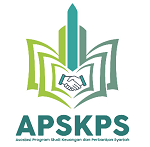Citation analysis of 10-year Islamic economic research papers indexed in dimensions.ai
(1) Faculty of Islamic Economics and Business, Mataram State Islamic University
(2) Faculty of Islamic Economics and Business, Mataram State Islamic University
(3) Faculty of Islamic Economics and Business, Mataram State Islamic University
(*) Corresponding Author
Abstract
The main objective of this study is to analyze cited papers in terms of the most cited author, journal, article, and institution. All documents are listed on dimensions.ai as the source of papers and containing the keyword “Islamic economics†in the title or abstract of the articles. The research method used in this study is citation analysis. The publication period is 10 years, starting from 2012 to 2021. This study showed that only 264 (19.32%) of 1,366 published articles were cited at least once by other documents during the observation period. The majority of these items came from Indonesia, with a total of 120 documents (45.4%). The most cited author is Hafas Furqani with 13 articles (4.9%), the most cited journal is Jurnal Ekonomi Syariah (JES) with a total of 32 articles (12.1%), the most cited article is a paper titled "Corporate social responsibility, waqf system, and zakat system as faith-based model for poverty reduction" with its 33 citations, and the most cited institution is Airlangga University in Indonesia with a total of 18 articles (6.8%). This research also provided a finding that 25 institutions and organizations cite one another in their published articles.Â
Full Text:
PDFReferences
Chapra, M. U. (2001). What is Islamic Economics? Islamic Development Bank. Islamic Research and Training Institute, 33.
Chikate, R.V. & Patil, S.K. (2008) Citation analysis of theses in library and information science submitted to University of Pune: A pilot study. Library. Philosophy and Practice.
DÃez-MartÃn, F., Blanco-González, A., & Prado-Román, C. (2021). The intellectual structure of organizational legitimacy research: a co-citation analysis in business journals. Review of Managerial Science, 15(4), 1007-1043.
Handoko, L. H. (2020). Bibliometric analysis and visualization of Islamic economics and finance articles indexed in Scopus by Indonesian authors. Science Editing, 7(2), 169-176.
Hassanzadeh, M., & Saber, S. S. A Citation Analysis of the Scientific Publication of Universities: A Study of Tarbiat Modares University during 1988-2019.
Herzog C., Hook D., dan Konkiel S., 2020. Dimensions: Bringing down barriers between scientometricians and data. Quantitative Science Studies. Vol. 1, No.1, 387–395. doi: https://doi.org/10.1162/qss_a_00020
Hota, P. K., Subramanian, B., & Narayanamurthy, G. (2020). Mapping the intellectual structure of social entrepreneurship research: A citation/co-citation analysis. Journal of Business Ethics, 166(1), 89-114.
John Martyn, (1975) "CITATION ANALYSIS", Journal of Documentation, 31(4) 290-297, https://doi.org/10.1108/eb026610
Khan, M. A. (1994). An introduction to Islamic economics (Vol. 15). International Institute of Islamic Thought (IIIT).
Khandare, S. B., & Sonwane, S. S. (2021). Citation Analysis of Economics Ph. D. Theses of Dr. Babasaheb Ambedkar Marathwada University Aurangabad: A Scientometric Study. Journal of Indian Library Association, 57(2), 50-59.
Mannan, M. A. (1986). Islamic economics: theory and practice; (foundations of Islamic economics). Westview Press.
Saikia AS, A., & Saikia US, U. (2020). Citation analysis of doctoral theses submitted to The Departement of Chemistry, Dibrugarh University, Assam, India. Library Philosophy and Practice (e-journal). 4525.
Sithas, M. T. M., & Surangi, H. A. K. N. S. (2021). Systematic Literature Review on Ethnic Minority Entrepreneurship: Citation and Thematic Analysis. Journal of Ethnic and Cultural Studies, 8(3), 183-202.
DOI: 10.24235/amwal.v13i2.8863
Article Metrics
Abstract view : 108 timesPDF - 12 times
Refbacks
- There are currently no refbacks.
Indexed by:






Mailing Address:
Department of Sharia Banking, Faculty of Islamic Economics and Business, UIN Siber Syekh Nurjati Cirebon
Jl. Perjuangan By Pass Sunyaragi Kesambi Kota Cirebon
E-Mail: journal.alamwal@gmail.com
![]()
Al-Amwal: Jurnal Ekonomi dan Perbankan Syariah is licensed under a Creative Commons Attribution 4.0 International License








